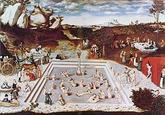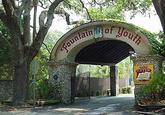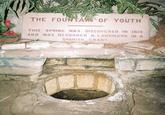The Fountain of Youth
Deadpool 4,689
This entry has been rejected due to incompleteness or lack of notability.
To dispute this DEADPOOL flagging, please provide suggestions for how this entry can be improved.
This entry has been rejected due to incompleteness or lack of notability.
To dispute this DEADPOOL flagging, please provide suggestions for how this entry can be improved, or request editorship to help maintain this entry.
NOTE: This Entry was related to the 2013 April Fools joke. For more information, please check out the KYMdb Offline Crisis Response Initiative.

| Navigation |
| About • Origin • Spread • History of References • External References • Recent Images |
About
The Fountain of Youth is a mythical spring which offers restorative powers to those who drink its water. The Fountain gained popularity in the 16th century after Spanish conquistador Juan Ponce de León was reported to have gone searching for it on his travels to modern-day Florida.
Origin
One of the earliest mentions of a fountain with healing water was mentioned in the third book[2] of Histories[1] by ancient Greek historian Herodotus[3] in the mid-400s BC. Though similar healing waters persisted in the mythical exploits revolving around Alexander the Great[4] and Khidr[5], the idea gained much traction through a mention in the 14th century novel The Travels of Sir John Mandeville.[6] The excerpt (shown below) refers to a chasm found at the foot of an unknown mountain outside of modern-day Kollam, India as "the well of youth."[7]
And at the foot of that mount is a fair well and a great, that hath
odour and savour of all spices. And at every hour of the day he
changeth his odour and his savour diversely. And whoso drinketh
three times fasting of that water of that well he is whole of all
manner sickness that he hath. And they that dwell there and drink
often of that well they never have sickness; and they seem always
young. I have drunken thereof three or four sithes, and yet,
methinketh, I fare the better. Some men clepe it the well of
youth. For they that often drink thereof seem always young-like,
and live without sickness. And men say, that that well cometh out
of Paradise, and therefore it is so virtuous.
Spread
In the early 16th century, Juan Ponce de León[10] was charged with exploring the island of Bimini[8] located in the Bahamas, which was rumored to have a spring that would restore youth to aging men.[9] On his 1513 trip, de León did not make it to the Bahamas, but instead landed in Florida where he claimed the land for Spain. Though he did not write about searching for the Fountain himself, Gonzalo Fernández de Oviedo y Valdés[11] claimed in 1535 that the conquistador set out on his voyage not to conquer new land, but to seek out a cure for his old age.

The alleged landing site of de León in present-day St. Augustine, Florida drew visitors since as early as the 1860s. The park and its spring was turned into a tourist attraction known as the Fountain of Youth Archaeological Park[12] in 1904 by Luella Day McConnell[13], who would tell tall tales to the park's visitors. As of March 2013, the park is still open to the public daily where people can purchase water from the on site spring, though it is unclear whether or not this was the actual spring de León sought out.


History of References

External References
[1] Wikipedia – Histories (Herodotus)
[2] Herodotus' Histories – Book 3
[4] Wikipedia – Alexander romance
[6] Wikipedia – John Mandeville
[7] Project Gutenberg – Etext: The Travels of Sir John Mandeville
[9] Douglas T. Peck – Misconceptions and Myths Related to the Fountain of Youth and Juan Ponce de Leon’s 1513 Exploration Voyage
[10] Wikipedia – Juan Ponce de León
[11] Internet Archive – Historia General Y Natural De Las Indias
[12] Fountain of Youth Park – Home
[13] City of St. Augustine – Great Floridians 2000: Dr. Luella Day McConnell
Recent Videos
There are no videos currently available.






Comments ( 5 )
Sorry, but you must activate your account to post a comment.
Please check your email for your activation code.